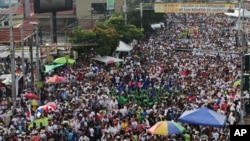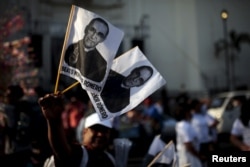Hundreds of thousands of worshippers converged on the Salvadoran capital Saturday to witness the the beatification of the late Archbishop Oscar Romero. A papal declaration leaves the assassinated prelate one step from Roman Catholic sainthood.
Romero -- revered by the poor and reviled by the right-wing government in power 35 years ago -- was gunned down in 1980 by a right-wing death squad for his support of the country's poor. Shortly after the killing, El Salvador erupted into a 13-year civil war that claimed an estimated 75,000 lives.
On Saturday, flag-waving supporters -- many of them wearing t-shirts emblazoned with Romero's face -- heard an envoy of Pope Francis read a papal letter proclaiming the beatification.
U.S. President Barack Obama, in a statement, welcomed the honor, calling Romero "an inspiration for the people of El Salvador and across the Americas."
Four presidents and envoys from scores of countries also paid tribute to the cleric, who is widely known among supporters as "the voice of the voiceless."
Romero's impassioned sermons, widely heard on Salvadoran radio in the years before his death, riled right-wing extremists and triggered alarm in the U.S.-backed Salvadoran government.
The push for Romero's sainthood was long resisted by conservative Catholics and Salvadoran right wingers, who linked the archbishop's sermons to Marxism, as the Cold War played out in the late 1970s.
But Saturday, even the country's right-wing Arena Party showed support for the beatification in a newspaper advertisement praising Romero for "his message of reconciliation."
Romero's legacy
In life, Romero was loved by the poor, whom he defended passionately, and loathed by conservatives who considered him too close to left-leaning movements in the tumultuous years ahead of El Salvador's 1980-92 civil war.
Romero was celebrating Mass in a cancer hospital chapel on March 24, 1980, when he was shot through the heart by a sniper who apparently fired from a car outside.
The day before, Romero had delivered a strongly worded admonition to the U.S.-backed military to stop repressing civilians.
The trigger man has never been identified, and no one has been prosecuted for the killing. Alleged paramilitary death squad leader Roberto d'Aubuisson, who was named by a U.N. truth commission after the war's end as the mastermind of the assassination, died in 1992 having maintained his innocence to the end.
Romero's beatification was held up for years by church politics until Pope Benedict XVI "unblocked" the case in late 2012, after it was determined he had not been an adherent of revolutionary liberation theology as many claimed.
Saturday's ceremony constitutes official church approval of Romero's legacy, even if some conservatives in the Vatican and Salvadoran society still view his memory with distaste.
A huge stage was erected in recent days beneath the square's 18-meter-tall monument depicting Christ atop a white pillar and blue globe. An urn there contains the shirt that Romero was wearing when he was shot.
Officials closed off about 5 square kilometers (2 square miles) of streets nearby to accommodate the expected crush of pilgrims, many of them bused in from the countryside, and the hundreds of vendors selling commemorative T-shirts, key chains, bags, bracelets and coffee cups for $2 to $5 as well as copies of documentaries and movies inspired by Romero's life.
Authorities set up 27 giant screens for the benefit of those far from the stage and deployed 3,700 police and soldiers to provide security. Hotels in the capital were at capacity, and officials predicted the event would generate $31 million in economic activity.
Celebrations were also planned in Los Angeles, which is home to about 360,000 people of Salvadoran origin. Many of them arrived in the 1980s fleeing the Central American nation's civil war, in which at least 75,000 people died and 12,000 more disappeared.
Kenya celebrates nun
Also Saturday, tens of thousands of people gathered in the central Kenyan town of Nyeri to attend the beatification ceremony of Sister Irene Stefani, an Italian nun who worked for many years in the East African nation.
Stefani, who belonged to the Consolata Missionary Sisters, first came to Kenya in 1915 and died there in 1930 at the age of 39, according to a website dedicated to her beatification.
In her case, beatification comes after official verification of a 1989 miracle in Mozambique – a country Stefani never visited – that was attributed to her.
The miracle reportedly happened when a group of about 270 people in danger of death prayed to Sister Irene "and the little water in the baptismal font, measuring between four and six liters, was multiplied to enable them to drink and wash for four days, before help arrived from outside," Kenya's Daily Nation newspaper reported, citing a priest in charge of Nairobi's Consolata Shrine.
Aru Pande contributed to this report from the White House. Ap contributed to this report.






